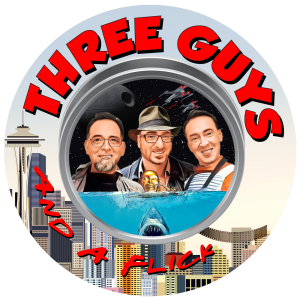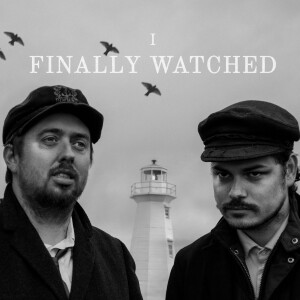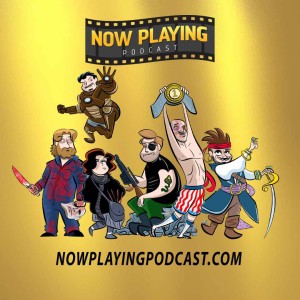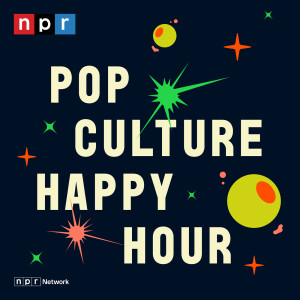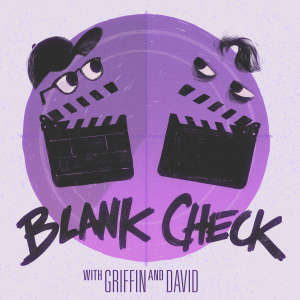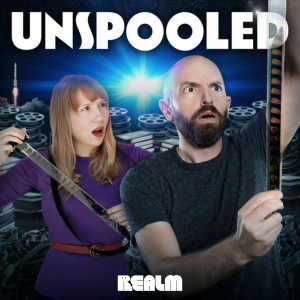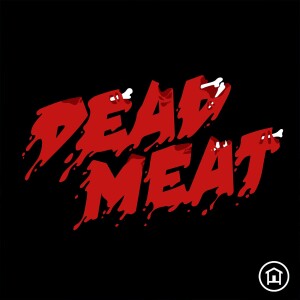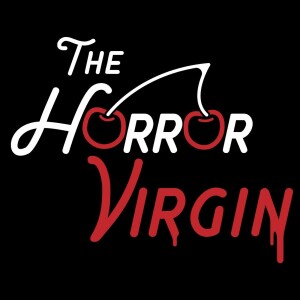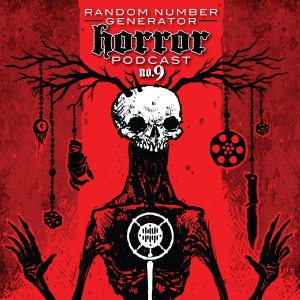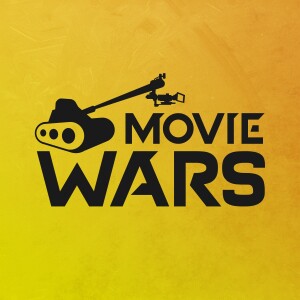

Episode List

Tron with Comedian Evan Berke
The central theme of this Movie Wars episode is the groundbreaking 1982 film Tron, a movie that didn’t just dabble with computer-generated imagery—it invented the playbook for CGI in cinema. Kyle, Seth, and returning guest Evan Burke (fresh off crushing Kill Tony in front of 15,000 people at Bridgestone Arena) break down how Tron went from Disney’s underdog experiment (that even its own animators tried to derail) to a cult classic that shaped the future of sci-fi filmmaking.We dive into the wild behind-the-scenes stories: from 75,000 hand-colored frames and animators literally coding animations by spreadsheet, to Wendy Carlos’ genre-defining electronic score (two years removed from The Shining). We also unpack the film’s legacy, its infamous Oscar snub for “cheating” with CGI, and how its philosophy of “users vs. programs” still feels eerily relevant in today’s tech-driven world.Along the way we debate whether Jeff Bridges’ Flynn is underrated or overrated compared to his Lebowski and True Grit roles, reveal Easter eggs like the hidden Mickey and Pac-Man cameo, and ask the big question: does Tron hold up in 2025 with its remastered 4K release?If you’ve ever stepped into an arcade, geeked out over CGI, or wondered how we got from Pong to PlayStation 5, this is the Tron deep dive for you.Takeaways:Tron’s revolutionary CGI: how Disney execs resisted it, why animators hated it, and why the Oscars called it “cheating.”Behind the scenes madness: 75,000+ frames hand-colored, six layers of film for every Grid shot, and multiple VFX houses hacking it together in 1982.Legacy & influence: how Tron predicted the language of firewalls, inspired cult fandom, and paved the road for The Matrix and modern CGI blockbusters.Jeff Bridges debate: is Flynn one of his most underrated roles or just “fun bad acting”?Easter eggs galore: hidden Mickeys, Pac-Man cameos, and Wendy Carlos’ groundbreaking soundtrack.Special guest highlight: Evan Burke joins us right after performing live on Kill Tony at Bridgestone Arena.Links referenced in this episode:YouTube (Evan’s Kill Tony set)Evan's comedy Special "Twice Removed" Kill Tony Podcast (episode 725)Reddit threads discussing Tron’s cult statusCompanies mentioned:Disney (distributors and reluctant backers)Bridgestone Arena (where Evan crushed Kill Tony the night before recording)Kill Tony (comedy crossover mentioned in the episode)

Training Day with McKenna McFadden
In this episode of Movie Wars, Kyle and Seth team up with guest McKenna McFadden to break down Antoine Fuqua’s Training Day — the movie that turned Denzel Washington into one of cinema’s greatest antiheroes. We unpack the Rampart-scandal roots, the wild casting stories (Eminem as Hoyt?!), on-set tricks that shaped Ethan Hawke’s performance, and why “King Kong ain’t got s*** on me” may have clinched the Oscar. Plus: real gang-neighborhood shoots, Latino representation, and a lively debate over music cameos that almost derailed the vibe.⏱️ Timemarkers00:00 – Intro & McKenna joins the couchtrain-175840256973602:40 – Why Training Day mattered at the end of the ’90strain-175840256973604:00 – Casting chaos: Samuel L. Jackson, Eminem, Matt Damontrain-175840256973606:10 – Denzel vs NAACP concerns & Fuqua’s visiontrain-175840256973608:10 – Kyle’s undercover-cop dad connectiontrain-175840256973611:00 – Filming in real gang neighborhoods & the “poker scene” tension hacktrain-175840256973613:30 – Eva Mendes, Terry Crews & Latino reptrain-175840256973614:50 – “King Kong ain’t got on me”: the improvised line that made historytrain-175840256973619:20 – Heat check: best LA movie? Training Day vs Heattrain-175840256973620:40 – Denzel’s Oscar vs Russell Crowe & Ian McKellentrain-175840256973622:45 – PCP, moral slide & why Hoyt’s arc workstrain-175840256973624:20 – Alternate timeline: Eminem as Jake Hoyttrain-175840256973627:00 – Music cameos graded: Snoop, Dre, Macy Graytrain-175840256973630:30 – DMX or Ice-T as better fits for Dre’s role?train-1758402569736📌 Show Notes & TakeawaysTraining Day captures LA’s dangerous pulse through authentic locations & casting.Denzel Washington’s Alonzo Harris redefined how villains can command the screen.Ethan Hawke’s rookie energy came alive thanks to clever directing tricks.Real gangs, real tension: Fuqua’s background in music videos brought street realism.“King Kong ain’t got s*** on me” was pure improv — and pure Oscar gold.Even polarizing cameos add to the film’s gritty texture.

Once Upon A Time In Hollywood with McKenna McFadden
Tarantino’s sun-bleached fairytale gets the full Movie Wars teardown. I’m joined by Seth and McKenna McFadden to dig into Once Upon a Time in Hollywood: the Rick/Cliff bromance (Leonardo DiCaprio & Brad Pitt), the Sharon Tate revision, the Bruce Lee fight debate, and why Quentin himself calls this his best film.We trace how the idea sparked on the Death Proof set while Tarantino watched the actor–stuntman bond, how Rick & Cliff were stitched from real Hollywood pairings (Burt Reynolds/Hal Needham; Steve McQueen/Bud Ekins), why it nearly became a Manson movie, and why he wrote five episodes of “Bounty Law” just to make Dalton feel real. We also hit the Sony deal (post-Weinstein), needle-drop genius (real KHJ radio airchecks), and the stunt-culture DNA that still shapes modern action .⏱️ Chapters00:03 Cold open & welcome00:17 Show format + guest intro (NYU → WWE; music licensing)01:57 LA golden age vs today02:00 Why it's our Tarantino favorite/rankings02:39 Tarantino says it's his best03:29 Origin on Death Proof set; actor–stuntman dynamic03:53 Rick & Cliff modeled on Reynolds/Needham, McQueen/Ekins05:21 It started as a novel / novelization06:54 From Charles Manson project to Hollywood elegy07:38 Tarantino “universe” & alternate history09:02 Tarantino wrote five “Bounty Law” episodes09:20 Fincher’s Cliff Booth project (debate if needed)09:52 Sony deal, $100M budget, Weinstein split11:58 Bruce Lee scene discourse12:30 Martial arts’ impact on action; Casino Royale pivot16:25 Real KHJ radio airchecks; no original score22:55 War Zone: Round 1 (mid-episode volley)28:24 Randos → Questions transition42:09 Questions: character & craft42:50 Penultimate question: Tarantino’s “best” claim51:08 Last question: Who/What won & lost the movie?58:15 Influences & tone (Texas Chainsaw vibes60:24 Scorecard: Yes/No63:38 Final scores & sign-off💡 TakeawaysTarantino almost wrote Once Upon a Time as a novel before filming.Rick Dalton & Cliff Booth sprang from real Hollywood duos.Sony’s $100M deal gave Quentin final cut and first-dollar gross after splitting from Weinstein.The Bruce Lee scene was meant as a satire of old vs new Hollywood, but still divides fans.The soundtrack uses authentic KHJ radio tapes—no original score—so LA itself becomes the music.

Flatliners (1990) with comedian Dr. Ben
Today on Movie Wars, we dive headfirst into Joel Schumacher’s 1990 cult thriller Flatliners. With an all-star cast of Julia Roberts, Kevin Bacon, Kiefer Sutherland, and William Baldwin, the film follows a group of med students who push science (and sanity) to the limit by experimenting with near-death experiences.Kyle, Seth, and Dr. Ben (comedian and real-life physician) break down the history, the behind-the-scenes drama, and why this wild Brat Pack–era sci-fi horror flick feels more like The Breakfast Club Dies than a medical thriller. From medical inaccuracies (you can’t actually shock a flatline) to Joel Schumacher’s gothic Chicago aesthetic, we uncover how Flatliners mixes big ideas about mortality with questionable execution.We’ll also hit the random facts, the funniest discoveries from our research, and debate whether Flatliners deserved cult status—or just a DNR order.Show Notes / TakeawaysThe true story behind screenwriter Peter Filardi’s inspiration and Joel Schumacher’s obsession with death.Michael Douglas stepping in as producer and early casting “what-ifs” (Val Kilmer, Nicole Kidman).Dr. Ben fact-checks the movie’s wild CPR and defibrillator scenes—spoiler: none of it works.Why the Brat Pack label followed this cast and why the characters never land emotionally.Cinematography, lighting, and Schumacher’s gothic style vs. storytelling gaps.Our take: this premise deserved a miniseries, not a two-hour chaos ride.Chapters & Timestamps00:00 – Welcome to Movie Wars – Kyle, Seth, and Dr. Ben kick things offflatliners-175709869808301:00 – How the show works – History, Randos, Questions, War Cardflatliners-175709869808302:00 – First impressions of Flatliners – VHS memories, ethics class screenings, and why it’s so wacky03:00 – Medical perspective – Dr. Ben explains why shocking a flatline is nonsense06:30 – History & development – From spec script to Schumacher’s obsession with death07:30 – Early casting rumors – Val Kilmer and Nicole Kidman almost starred08:45 – Acting & characters – Why Julia Roberts and Kiefer Sutherland couldn’t save it10:00 – Bacon talk – Kevin Bacon’s hair, career tangents, and Six Degrees13:00 – Stephen King confusion – Why the movie feels like a bad King adaptation14:15 – Why it should’ve been a miniseries – Missed opportunity for depth15:00 – Hallucination scenes – The film’s weakest link (bad child actors, floaty trees)17:00 – Comedy parallels – Hecklers, bombing on stage, and Flatliners as metaphor18:30 – Randos – Loyola University, Chicago filmmaking push, and production trivia21:00 – DMT & near-death theories – Real science vs. Flatliners’ Hollywood spin-22:00 – Chicago vs. Boston setting – Why Schumacher moved the story to the Midwest23:30 – Brat Pack label – Was this really an ’80s ensemble movie in disguise?26:00 – The War Card – Who did “life after death” better: Flatliners or The Sixth Sense?

Dallas Buyers Club with Comedian Dr. Ben
Today we dive into Dallas Buyers Club, a film that took nearly 20 years to get made, changed the trajectory of Matthew McConaughey’s career, and gave Jared Leto one of the most transformative roles of his life.Joining us is Dr. Ben—orthopedic surgeon by day, comedian by night, and now a regular at Zanies Nashville. He brings both medical perspective and sharp comedic timing to the table, making this one of our most unique breakdowns yet.We cover the brutal realities of AIDS in the 1980s, the insane lengths McConaughey and Leto went to transform their bodies, how the film almost fell apart days before production, and why director Jean-Marc Vallée’s handheld style made the movie feel more like a documentary than a drama. Plus, we get into the McConaissance, Hollywood’s obsession with body transformations, and whether True Detective or Dallas Buyers Club was McConaughey’s best performance.⏱️ Chapter Time Markers00:00 – Welcome & intro to Dr. Ben (surgeon + comedian)05:40 – The 20-year battle to get Dallas Buyers Club made07:30 – McConaughey’s career pivot & the birth of the McConaissance09:00 – Losing funding mid-shoot & how they saved the fil11:00 – Jared Leto’s Rayon & breaking barriers for trans representation13:20 – Jean-Marc Vallée’s documentary-style realism14:50 – Extreme body transformations: McConaughey vs. Leto17:40 – Christian Bale comparisons & medical risks of yo-yo acting22:00 – The McConaughey debate: True Detective vs. Dallas Buyers Club25:30 – Early McConaughey roles (Angels in the Outfield, Texas Chainsaw Massacre)28:00 – Legacy of the film & its Oscar wins🔑 Show Notes & TakeawaysDallas Buyers Club was rejected over 100 times before finally being made on a shoestring $5M budget. It went on to gross $55M and win 3 Oscars. McConaughey lost nearly 60 pounds and Leto about 40 pounds, pushing their bodies to dangerous extremes for authenticity. Jared Leto’s role as Rayon broke ground for serious representation of trans characters in film, shifting away from decades of ridicule or parody. Director Jean-Marc Vallée shot with natural light and handheld cameras, giving the film its raw, documentary feel. The “McConaissance” began here—McConaughey turned down $20M+ rom-com offers to reinvent himself as a serious actor. The makeup team famously pulled off their Oscar-winning work with a $250 budget
Create Your Podcast In Minutes
- Full-featured podcast site
- Unlimited storage and bandwidth
- Comprehensive podcast stats
- Distribute to Apple Podcasts, Spotify, and more
- Make money with your podcast
